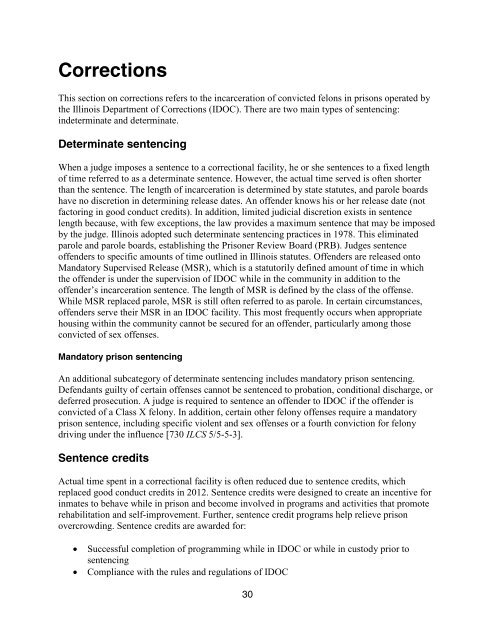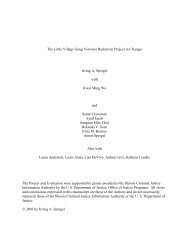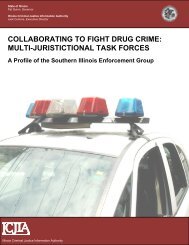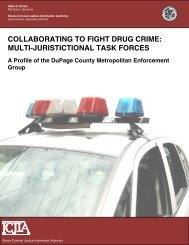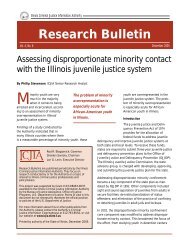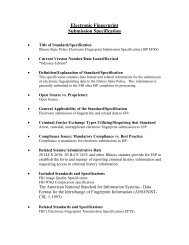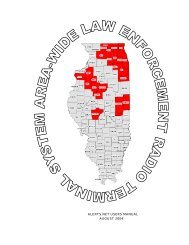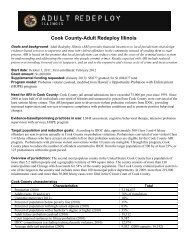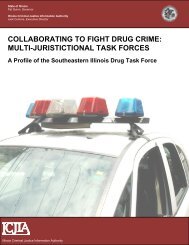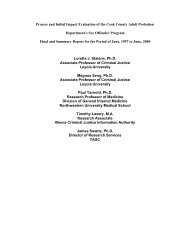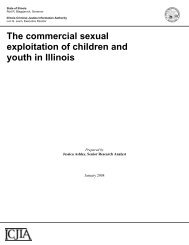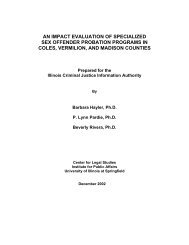policies and procedures of the illinois criminal justice system
policies and procedures of the illinois criminal justice system
policies and procedures of the illinois criminal justice system
You also want an ePaper? Increase the reach of your titles
YUMPU automatically turns print PDFs into web optimized ePapers that Google loves.
Corrections<br />
This section on corrections refers to <strong>the</strong> incarceration <strong>of</strong> convicted felons in prisons operated by<br />
<strong>the</strong> Illinois Department <strong>of</strong> Corrections (IDOC). There are two main types <strong>of</strong> sentencing:<br />
indeterminate <strong>and</strong> determinate.<br />
Determinate sentencing<br />
When a judge imposes a sentence to a correctional facility, he or she sentences to a fixed length<br />
<strong>of</strong> time referred to as a determinate sentence. However, <strong>the</strong> actual time served is <strong>of</strong>ten shorter<br />
than <strong>the</strong> sentence. The length <strong>of</strong> incarceration is determined by state statutes, <strong>and</strong> parole boards<br />
have no discretion in determining release dates. An <strong>of</strong>fender knows his or her release date (not<br />
factoring in good conduct credits). In addition, limited judicial discretion exists in sentence<br />
length because, with few exceptions, <strong>the</strong> law provides a maximum sentence that may be imposed<br />
by <strong>the</strong> judge. Illinois adopted such determinate sentencing practices in 1978. This eliminated<br />
parole <strong>and</strong> parole boards, establishing <strong>the</strong> Prisoner Review Board (PRB). Judges sentence<br />
<strong>of</strong>fenders to specific amounts <strong>of</strong> time outlined in Illinois statutes. Offenders are released onto<br />
M<strong>and</strong>atory Supervised Release (MSR), which is a statutorily defined amount <strong>of</strong> time in which<br />
<strong>the</strong> <strong>of</strong>fender is under <strong>the</strong> supervision <strong>of</strong> IDOC while in <strong>the</strong> community in addition to <strong>the</strong><br />
<strong>of</strong>fender’s incarceration sentence. The length <strong>of</strong> MSR is defined by <strong>the</strong> class <strong>of</strong> <strong>the</strong> <strong>of</strong>fense.<br />
While MSR replaced parole, MSR is still <strong>of</strong>ten referred to as parole. In certain circumstances,<br />
<strong>of</strong>fenders serve <strong>the</strong>ir MSR in an IDOC facility. This most frequently occurs when appropriate<br />
housing within <strong>the</strong> community cannot be secured for an <strong>of</strong>fender, particularly among those<br />
convicted <strong>of</strong> sex <strong>of</strong>fenses.<br />
M<strong>and</strong>atory prison sentencing<br />
An additional subcategory <strong>of</strong> determinate sentencing includes m<strong>and</strong>atory prison sentencing.<br />
Defendants guilty <strong>of</strong> certain <strong>of</strong>fenses cannot be sentenced to probation, conditional discharge, or<br />
deferred prosecution. A judge is required to sentence an <strong>of</strong>fender to IDOC if <strong>the</strong> <strong>of</strong>fender is<br />
convicted <strong>of</strong> a Class X felony. In addition, certain o<strong>the</strong>r felony <strong>of</strong>fenses require a m<strong>and</strong>atory<br />
prison sentence, including specific violent <strong>and</strong> sex <strong>of</strong>fenses or a fourth conviction for felony<br />
driving under <strong>the</strong> influence [730 ILCS 5/5-5-3].<br />
Sentence credits<br />
Actual time spent in a correctional facility is <strong>of</strong>ten reduced due to sentence credits, which<br />
replaced good conduct credits in 2012. Sentence credits were designed to create an incentive for<br />
inmates to behave while in prison <strong>and</strong> become involved in programs <strong>and</strong> activities that promote<br />
rehabilitation <strong>and</strong> self-improvement. Fur<strong>the</strong>r, sentence credit programs help relieve prison<br />
overcrowding. Sentence credits are awarded for:<br />
• Successful completion <strong>of</strong> programming while in IDOC or while in custody prior to<br />
sentencing<br />
• Compliance with <strong>the</strong> rules <strong>and</strong> regulations <strong>of</strong> IDOC<br />
30


